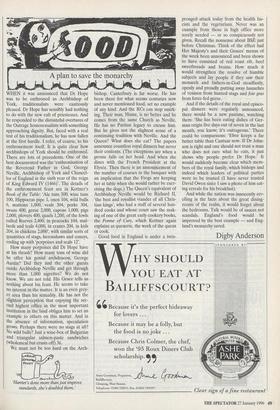A plan to save the monarchy L.4 111 LIR"LIPLoiftLii i i,—,#*LALJAIL WHEN it was
announced that Dr Hope was to be enthroned as Archbishop of York, traditionalists were cautiously pleased. Dr Hope has sensibly had nothing to do with the new cult of priestesses. And he responded to the distasteful overtures of the Outrage homosexualists with something approaching dignity. But, faced with a real test of his traditionalism, he has now fallen at the first hurdle. I refer, of course, to his enthronement itself. It is quite clear how archbishops of York should be enthroned. There are lots of precedents. One of the best documented was the `enthronisation of the Reverend Father in God, George Neville, Archbishop of York and Chancel- lor of England in the sixth year of the reign of King Edward IV (1466)'. The details of the enthronement feast are in Kettner's Book of the Table: 'Ale tuns 300, wine tuns 100, Hippocras pipe 1, oxen 104, wild bulls 6, muttons 1,000, veals 304, porks 304, swans 400, geese 2,000, capons 1,000, pigs 2,000, plovers 400, quails 1,200, of the fowls called Reeves 2,400, in peacocks 104, mal- lards and teals 4,000, in cranes 204, in kids 204, in chickens 2,000', with similar sorts of quantities of stags, heronshaws and coneys, ending up with 'porpoises and seals 12'.
How many porpoises did Dr Hope have at his thrash? How many tons of wine did he offer his genial archdeacon, George Austin? Did they and the other guests outdo Archbishop Neville and get through more than 1,000 aigrettes? We do not know. We are not told. His Grace tells us nothing about his feast. He seems to take no interest in the matter. It is an even grey- er area than his sexuality. He has not the slightest perception that enjoying the sec- ond highest office in the most important institution in the land obliges him to set an example to others on this matter. And in the absence of information, speculation grows. Perhaps there were no stags at all? No wild bulls? Just a wine-box of Bulgarian and triangular salmon-paste sandwiches (wholemeal but crusts off) 36.
We must not be too hard on the Arch- Haniet's done more than just improve standards, she's doubled them.' bishop. Canterbury is far worse. He has been there for what seems centuries now and never mentioned food, set no example of any kind. And the RCs can stop smirk- ing. Their man, Hume, is no better and he comes from the same Church as Neville. He has no Puritan legacy to excuse him. But he gives not the slightest sense of a continuing tradition with Neville. And the Queen? What does she eat? The papers announce countless royal dinners but never their contents. (The exceptions are when a grouse falls on her head. And when she dines with the French President at the Elysee. Then there is an announcement of the number of courses in the banquet with an implication that the Frogs are keeping her at table when she would rather be exer- cising the dogs.) The Queen's equivalent of Archbishop Neville would be Richard II, `the best and royallist viander of all Chris- tian kings', who had a staff of several hun- dred cooks and whose court saw the mak- ing of one of the great early cookery books, the Forme of Clay, which Kettner again explains as queuerie, the work of the queux or cook.
Good food in England is under a twin- pronged attack today from the health fas- cists and the vegetarians. Never was an example from those in high office more sorely needed — or so conspicuously not given. Recall the nonsense about BSE just before Christmas. Think of the effect had Her Majesty's and their Graces' menus of the week been announced and been shown to have consisted of red roast rib, beef sweetbreads and brains. How much it would strengthen the resolve of humble subjects and lay people if they saw their monarch and fathers-in-God steadfastly, openly and proudly putting away haunches of venison from hunted stags and foie gras from force-fed geese.
And if the details of the royal and episco- pal dinners were regularly announced, there would be a new pastime, watching them: 'She has been eating dishes of Ger- man origin five days out of seven in the last month, you know; it's outrageous.' There could be comparisons: `Ebor keeps a far better table than Cantuar now. If Dr John- son is right and one should not trust a man who does not care what he eats, it just shows why people prefer Dr Hope.' It would suddenly become clear which mem- bers of the royal family, which bishops and indeed which leaders of political parties were to be trusted (I have never trusted David Owen since I saw a photo of him eat- ing cereals for his breakfast).
And while the nation was innocently rev- elling in the facts about the great dining- rooms of the realm, it would forget about the bedrooms. Talk would be of sauces not scandals. England's food would be improved by the best example — and Eng- land's monarchy saved.
Digby Anderson


























































 Previous page
Previous page